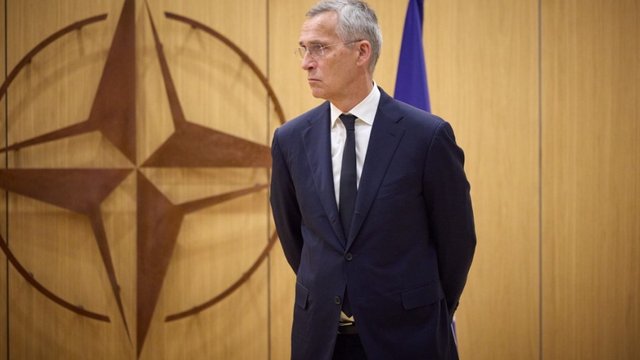Stoltenberg: NATO developing new format for providing Ukraine with further long-term, predictable aid

NATO Secretary General Jens Stoltenberg says the alliance is developing a new format for further assistance to Ukraine that will ensure predictability and stability.
He said this on Wednesday in Brussels before the start of a meeting of the foreign ministers of the alliance member countries, commenting at the request of journalists on information previously released to the media that the secretary general proposed a plan to create an aid package for the next five years in the amount of $100 billion, also giving the alliance leadership in the so-called Ramstein group, which is currently led by the United States.
"So we must stand firm in our support to Ukraine. And I welcome that Allies continue to make major deliveries of weapons, ammunition, and equipment. But Ukraine has urgent needs. Any delay in providing support has consequences on the battlefield as we speak. So we need to shift the dynamics of our support. We must ensure reliable and predictable security assistance to Ukraine for the long haul. So that we rely less on voluntary contributions and more on NATO commitments. Less on short-term offers and more on multi-year pledges. Therefore Ministers will discuss how NATO could assume more responsibility for coordinating military equipment and training for Ukraine anchoring this within a robust NATO framework. We will also discuss a multi-year financial commitment to sustain our support," he outlined the framework for the allies' work on a new format of assistance to Ukraine.
The Secretary General said that 99% of the support to Ukraine comes from NATO allies, "so, doing more under NATO would make our efforts more efficient, and more effective."
"Moscow needs to understand that they cannot achieve their goals on the battlefield and they cannot wait us out," Stoltenberg said.
At the same time, he declined to disclose more details about the new format.
"Well, I see that you have been briefed on the proposal, but I will not go into the details of the proposal. What I can say is that I welcome that Allies agree that we need to sustain our support to Ukraine, we need to make it more robust and therefore we are now discussing ways to institutionalize more of the support within a NATO framework to make it more predictable to make it more robust, because we strongly believe that support Ukraine should be less dependent on short term voluntary offers and more dependent on long term NATO commitments," the Secretary General said.
According to him, by doing so, the allies will provide Ukraine with what it needs – "reliable and predictable security assistance to Ukraine for the long haul."
"If you want this war to end, the sooner we can convince Moscow that they will not win on the battlefield, that they cannot wait us out, the sooner we can then be able to reach a peace agreement where Russia realized that that they cannot win the war, but have to sit down and negotiate an agreement where Ukraine prevails as a sovereign independent nation. So a stronger NATO role in coordinating and providing support is a way to end this war in a way where Ukraine prevails," Stoltenberg said.
The alliance already has a lot of coordination, 99% of the support to Ukraine comes from NATO allies, he noted.
Stoltenberg welcomed the capability coalition's Ramstein format and many other multinational and bilateral initiatives.
"But there is a need to give this a more robust and institutional framework to ensure predictability and commitment for the long haul," he said.
The Secretary General also avoided the questions about the expected $100 billion and about a possibility of making a decision to cancel Ramstein.
"So first, what is obvious is that we need new and more money for Ukraine and we need it over many years. And the whole idea now discussing framework commitments and institutionalized framework for the support is to ensure more predictability and more confidence in that moment will come every month every year for the long haul. So again, I will not go into the details," he said.
He also said there will be no finalization at the Meeting of Foreign Ministers today and tomorrow.
"We will hopefully move forward towards consensus and then we will have an agreement in place by the summit," Stoltenberg said.
He stressed that "whatever we do, of course, will be closely coordinated with all the other initiatives" which involve NATO allies.









